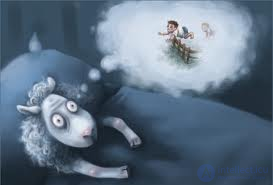Insomnia is a sleep disorder: most often it is difficult to fall asleep. Or I woke up and did not fall asleep anymore ... He lies, turns and cannot get to sleep.
Causes of Insomnia
The reasons can be many very different. More often:
- Aroused, anxious ... Something very excited, most often - negative.
- Late woke up or slept during the day.
- They drank something tonic. Coffee? Tea? Any cola? Have you eaten a lot of chocolate?
- Some kind of medicine.
- Consequences of shift work or air travel with a change of time zone.
- Very hungry - or, on the contrary, before going to bed they ate a lot.
Knowing the reasons calms down by itself ("It's okay, it will pass!") And tells you what you need (or rather what you don't need) to do next time.

What helps to fall asleep
Different people helps different things, here we list the most popular tools:
- Quiet half-hour walk before bedtime.
- Directly before bedtime - a warm (well warmed) shower with a rubbing. Option - 3-4 hours before bedtime take a hot bath. (If there are problems with the cardiovascular system, then take a bath 2 hours before bedtime, and not hot, but warm).
- Men have sex. Women, on the contrary, are more likely to have sex.
- Half a cup of hot (but not boiled) milk with a spoon of honey. Or light herbal preparations: Persen or skono.
Creative people can go completely non-standed way and create their own life situations when falling asleep becomes profitable. See →
Additionally, it is useful to pay attention
There are more general things that are also important to pay attention to:
- Air the room. Easy cool air helps to fall asleep.
- The easiest way to fall asleep naked, without clothes. If you are accustomed to sleep in clothes - let it be spacious and comfortable: it does not press from natural fibers either.
- Silence and the absence of annoying smells. In panel houses it is useful to have air humidifiers.
- It is easier to fall asleep in the dark - close the blinds and curtains. But remember - sometimes it makes it difficult to wake up well ...
- Take care of a comfortable bed. Best of all - an orthopedic mattress: moderately soft and smooth.
- The bed should be associated with sleep. Do not use the bed for anything other than sleep and sex: reading, computer and video games, watching TV, etc. (Advice on reading light is an exception to this rule.) Do not work in bed.
- It is advisable to go to bed at the same time. Avoid daytime sleep if you are tormented by insomnia. In the morning, get up at the same time, regardless of when you went to bed.
- Do not torment yourself with the desire to sleep. The more you force yourself to fall asleep, the slower the sleep comes. Better relax and relax yourself on something pleasant, sleep will come faster. It is extremely useful during the insomnia to engage in auto-training: you will either fall asleep right away, or practice well.
- If you understand that you are tormented by something definite, solve this question. If you need to write something down, stand up and write down. Just do not sit for a long time, go to bed again quickly. Sometimes it helps to write a plan for tomorrow or read a little something (but only a little!).
If all this does not help - go to the doctor. Without a doctor, do not prescribe sleeping pills for yourself - it is easy to run into unexpected complications.

Comments
To leave a comment
Psychophysiology
Terms: Psychophysiology